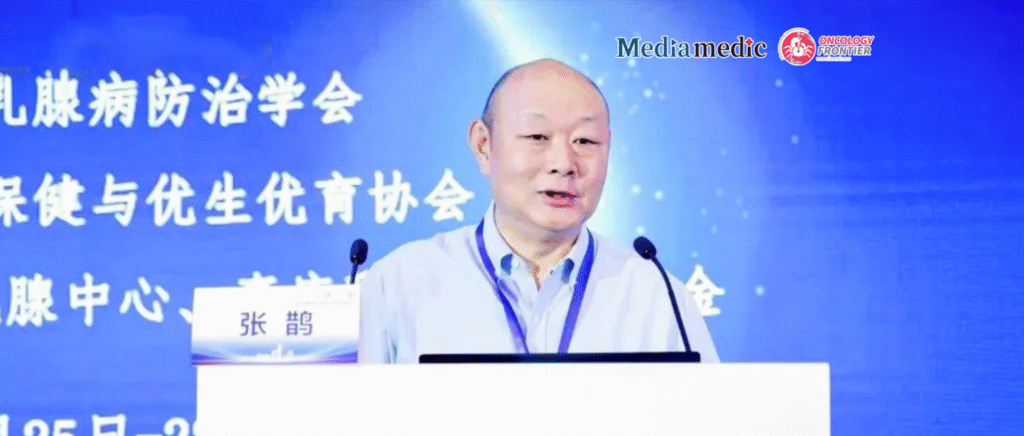
Editor’s Note: The 2025 Beijing Breast Cancer Forum and Breast Reconstruction Symposium, held from June 25 to June 28 in Beijing, was hosted by the Beijing Society for Breast Disease Prevention and Treatment and co-organized by the Breast Center of Peking University People’s Hospital and the Jiaqing Breast Cancer Prevention Foundation. During the conference, Oncology Frontier invited Prof. Que Zhang, Vice President of the Beijing Society for Breast Disease Prevention and Treatment, to provide in-depth insights into the current challenges and future directions of early breast cancer screening in primary care institutions in China. He also reflected on the broader significance of the newly launched “Peking University People’s Hospital Jiaqing Foundation Centennial Legacy Training Program.”Oncology Frontier: Primary care institutions play a vital role in promoting early detection and screening for breast cancer. What are the current challenges in this area, and how can the screening capabilities of primary care providers be improved?
Prof. Que Zhang: The regional disparities in breast cancer outcomes largely stem from the unequal distribution of medical resources. In major cities like Beijing and Shanghai, diagnostic and treatment standards are now on par with international benchmarks, and early detection rates are relatively high. However, a clear gap remains in primary-level regions. In clinical practice, we often encounter patients referred from rural areas who are already at an advanced stage upon diagnosis. Some even experience treatment delays due to initial misdiagnoses—such as mistaking breast cancer for skin disease—which has a direct negative impact on prognosis.
The root causes of this issue are multifaceted. First, public education and health literacy are insufficient, and patients often lack awareness of the disease. Second, there is an urgent need to improve the technical capabilities of healthcare providers in grassroots institutions. For example, in mammographic screening, physicians at primary hospitals often face challenges with proper positioning during imaging and accurate interpretation of results—both of which fall short when compared to specialists at large tertiary hospitals. These gaps can compromise the overall effectiveness of screening.
To address these challenges, we have initiated specialized training programs aimed at systematically strengthening capacity at the primary level. On one hand, we are enhancing public awareness and patient education surrounding breast cancer prevention and treatment. On the other, we are offering standardized technical training for grassroots healthcare professionals, with a strong emphasis on practical imaging skills and diagnostic accuracy.
We firmly believe that with continuous investment in capacity-building, the screening capabilities of primary institutions will steadily improve, ultimately benefiting a broader population of patients.
Oncology Frontier: Peking University People’s Hospital is known for its deep cultural legacy and extensive clinical experience. This year’s forum marks the official launch of the “Peking University People’s Hospital Jiaqing Foundation Centennial Legacy Training Program.” In your view, what is the significance of this initiative?
Prof. Que Zhang: In 1992, the renowned oncology expert Prof. Jiaqing Zhang established China’s first comprehensive breast disease center, integrating prevention, diagnosis, treatment, and research. He pioneered the multidisciplinary team (MDT) model in breast disease management. I had the privilege of learning directly from Prof. Zhang early in my career, and his meticulous approach and deep compassion for patients have always been an inspiration to me.
The launch of this Centennial Legacy Training Program carries forward Prof. Zhang’s academic philosophy and holds important value in four key areas:
First, for grassroots physicians, it represents a rare and valuable opportunity for advancement. With structured training and practical guidance, this program helps frontline doctors quickly improve their clinical skills, narrowing the gap with physicians at top tertiary hospitals. Ultimately, it enables more patients to access standardized, high-quality care at the primary level.
Second, for Peking University People’s Hospital, the program serves as an essential platform for academic inheritance. By sharing three decades of accumulated clinical experience, it not only expands the hospital’s influence but also attracts outstanding talent, injecting fresh vitality into the development of the breast specialty.
Third, for the Foundation, it is a concrete step in fulfilling its public welfare mission. As we often say, “A great physician is driven by compassion.” By cultivating more skilled professionals, we ultimately benefit a wider patient population. This is one of the most meaningful ways to “do good and give back to society.”
Most importantly, for society and patients, this is a key step toward raising the overall level of breast cancer diagnosis and treatment. Only when the capabilities of grassroots doctors are enhanced can we truly achieve early detection, early diagnosis, and early treatment—leading to improved outcomes and reduced burdens on families and the healthcare system. This ripple effect of “training one doctor to benefit an entire community” is exactly what we hope to see.
Prof. Jiaqing Zhang dedicated his life to the prevention and treatment of breast cancer. The establishment of this training program ensures that his academic legacy and humanitarian spirit live on. We believe that through ongoing investment in grassroots talent development, more breast cancer patients will benefit—this is the most meaningful tribute to Prof. Zhang’s lifelong mission.

Professor Que Zhang
Executive Vice President and Secretary-General of the Beijing Cancer Prevention and Treatment Society


